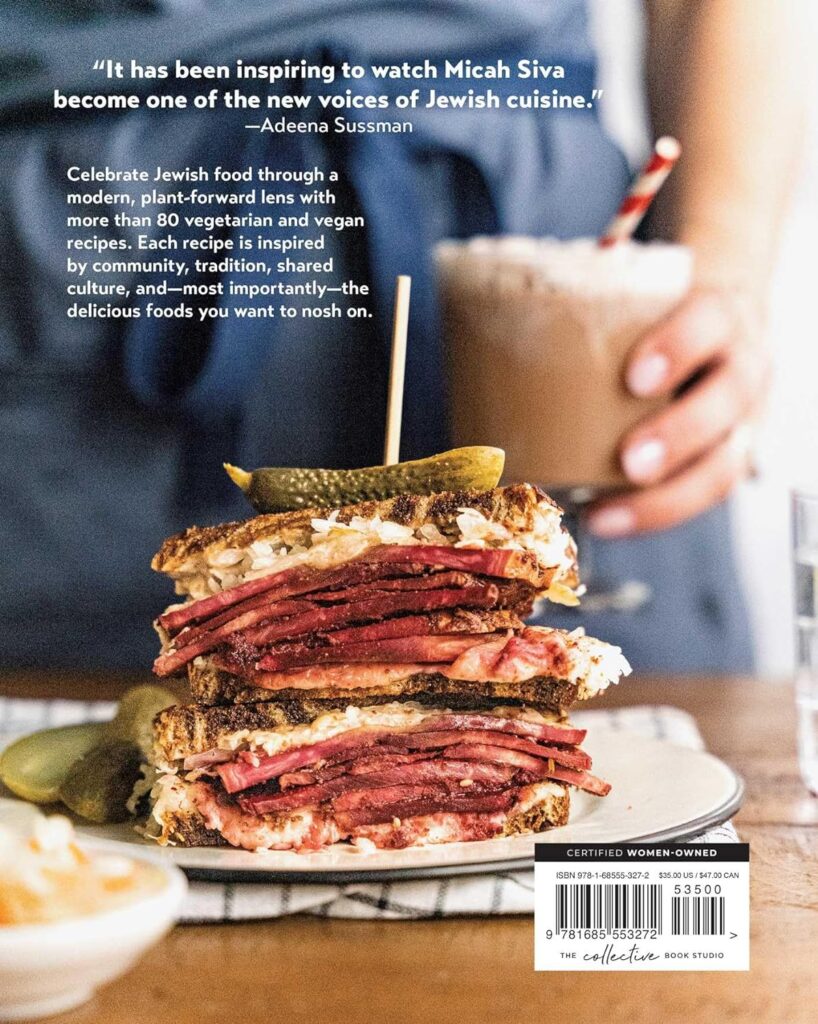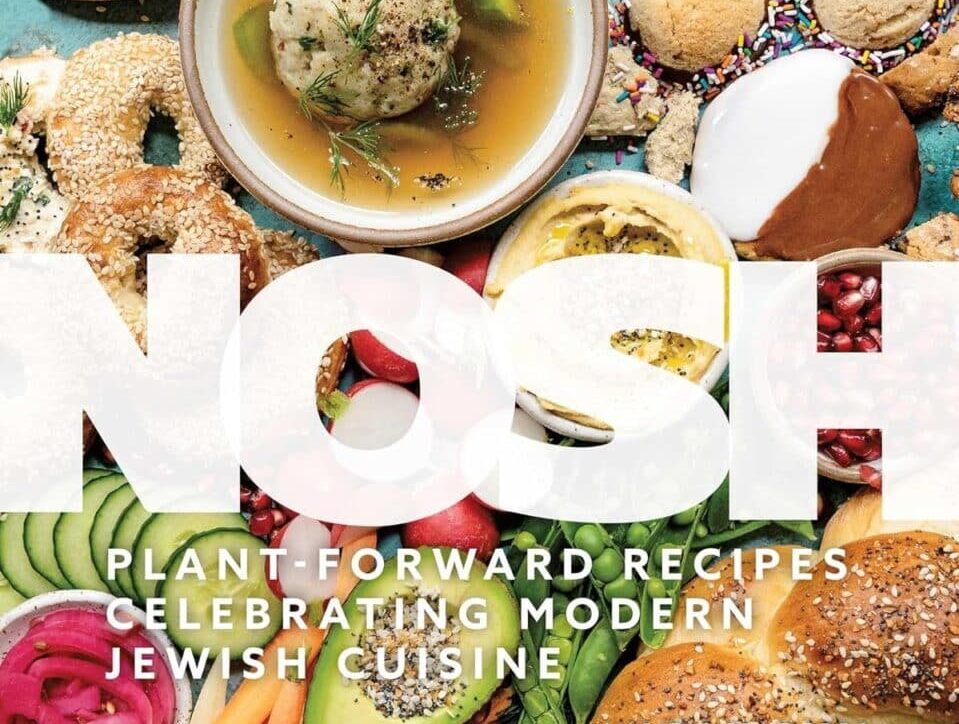Plant-Forward Recipes Celebrating Modern Jewish Cuisine
Nosh: Plant-Forward Recipes by Micah Siva
Nosh: Plant-Forward Recipes (The Collective Book Studio (March 5, 2024) by Micah Siva is a welcome addition to the growing list of new vegetarian cookbooks that are celebrating modern Jewish cuisine. Micah Siva is a trained chef, registered dietitian, recipe developer, and food photographer. Food is a central part of Jewish culture, and Nosh is the vegetarian cookbook for the modern Jewish kitchen. I was fortunate that Micah, a very busy new mom, graciously made time to chat with me on Zoom about her new award-winning book.
All cultures have their traditional food. What makes traditional Jewish food especially meaningful and significant?
Jewish food is significant because a lot of it tells a story of where Jews have ended up, typically because of persecution. It tells a story of migration and diversity, of how Jewish cuisine has also become what it is today. It tells so such much about the customs and values of Judaism. For example, long slow-cooked stews like cholent tell about the laws of Shabbat. Sometimes the ingredients themselves are symbolic and share so much information. So, for someone like me who grew up in a secular home, the way we really connected to our Judaism is through spending time at the dinner table, or the holiday table with our families. It’s such a huge part of Jewish culture and so many people relate to the traditions on their plates, especially in the lens of today. Food is the thing that brings all of (or most of us) together.
Unknown content block type: FlexiblePageTemplateFlexibleContentPhotoFullWidthLayout
{
"__typename": "FlexiblePageTemplateFlexibleContentPhotoFullWidthLayout"
}Do you see the Passover Seder as a place to bring together Jews and non-Jews?
When I was growing up my mom would always invite anyone from the neighborhood and we would have card tables lining the living room. Now I do the exact same thing. There’s a line in the Haggadah that says: “Let all those who are hungry come eat” and I think that especially in these days, inviting people to eat is a way of humanizing our culture. To say as Jews that we are not the enemy, we have to open doors. Jews value how food can bring us together by breaking bread (or matzoh). Passover is such a beautiful time to open up your door and share culture.
You included a “meatless” brisket recipe. But you don’t use any plant-based “meat” in your cookbook.
I didn’t use any of those in the book, and that was a conscious decision. I prefer to use things like mushrooms, tofu, tempeh and beans for the proteins. I’m a dietician. Nosh is not a health food book, but the brands of meat substitutes out there are not healthier than meat itself. I wanted this book to encompass various foods of the Diaspora, Sephardic, Mizrahi, and Ashkenaz. I’m Ashkenazi and my husband is Sephardic and I couldn’t make a cookbook feel authentic without some Ashkenazi-inspired dishes in it- the “brisket” recipe, for example, is made from tofu and mushrooms, and the marinade is inspired by the marinade my grandmother used in her brisket. So it has a lot of the similar flavors. It looks like meat and has textural qualities of the brisket. I wasn’t setting out to make a book of Jewish cuisine with recipes that were naturally vegetarian, like potato kugel and Sephardic salads and tagines with chickpeas. I thought it was important to be able to include vegetarians around the table with meat-like foods they may have grown up with.
Unknown content block type: FlexiblePageTemplateFlexibleContentPhotoFullWidthLayout
{
"__typename": "FlexiblePageTemplateFlexibleContentPhotoFullWidthLayout"
}Of course with a cookbook you can't please everyone...Especially in the Jewish community: two Jews, three opinions.
Of course with a cookbook you can’t please everyone. Some people wish it was all vegan, some people don’t like that there are so many vegan things. Some people hate that there is brisket and some people love that there is brisket. Some people think that it should be all Ashkenazi food, some people think it shouldn’t be. That’s been the biggest lesson in writing the cookbook. Especially in the Jewish community: two Jews, three opinions.
What motivated you to write a cookbook in addition to your blog and full-time job? How do you do it all?
I’m constantly exhausted. I work seven days a week. I have a very supportive partner. We figure it out as we go.
I wanted write a book essentially because I first became a vegetarian when I was twelve years old. My mom didn’t know what to do with me, especially when it came to holidays. She had spoken to a dietician to ask how do you eat healthy on a vegetarian diet and that’s when I started to really get into the kitchen, because my mom didn’t want to make multiple dinners. I had always just wished that there had been a vegetarian book that would help me and my family navigate the holidays. I saw that there was a resurgence of vegetarianism, particularly ethnic vegetarian cuisines, over the past several years. But there wasn’t any one that resonated with me under the Jewish umbrella. I saw a gap and that is where my blog has been focused and I worked on a proposal. It was for the book I wished I had growing up so I could have played a more active part of the family table.

I wanted write a book essentially because I first became a vegetarian when I was twelve years old. My mom didn’t know what to do with me, especially when it came to holidays. She had spoken to a dietician to ask how do you eat healthy on a vegetarian diet and that’s when I started to really get into the kitchen, because my mom didn’t want to make multiple dinners. I had always just wished that there had been a vegetarian book that would help me and my family navigate the holidays. I saw that there was a resurgence of vegetarianism, particularly ethnic vegetarian cuisines, over the past several years. But there wasn’t any one that resonated with me under the Jewish umbrella. I saw a gap and that is where my blog has been focused and I worked on a proposal. It was for the book I wished I had growing up so I could have played a more active part of the family table.
My husband and I talk all the time about what we can do so our son can have the best shot at embracing Judaism. Especially with me working in the Jewish food space, it would be so sad if he didn’t embrace it. I wrote Nosh and did most of it before I was pregnant. I came view it with a different lens after. It is so special that he can grow up with it; hopefully he can cook all these foods, and we can cook together. It can be passed down. It does shed a new light on why it is important.
Do other writers in the Jewish food space inspire you?
I’ve become good friends with Adeena (Sussman) and Leah (Koenig) throughout this. And there are other authors who inspire me with their takes, because a lot of the foods are relatively similar. But we all have our own little twist on them and stories behind them, so it’s inspiring to see how they’ve grown and achieved success. Everyone has been so welcoming and supportive, offering tips and advice.
What’s next?
I’m working on a new proposal but I definitely need to catch up on my day job and baby job, and I’m doing touring events for NOSH booked up until January. ![]()
